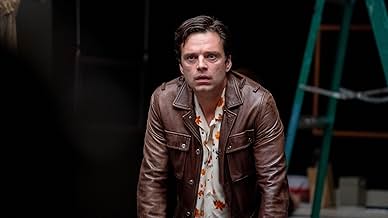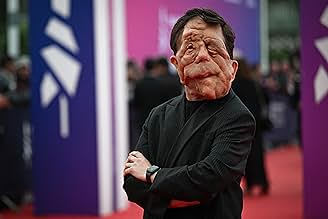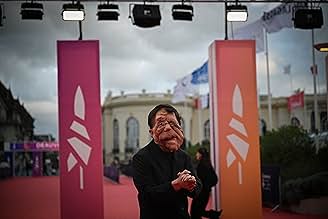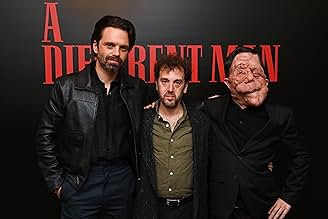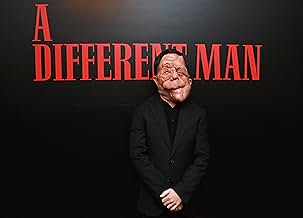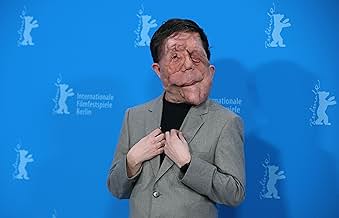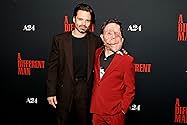Cuenta la historia de Edward. Tras someterse a una operación de reconstrucción facial, se queda prendado de un actor de una obra de teatro basada en su vida anterior.Cuenta la historia de Edward. Tras someterse a una operación de reconstrucción facial, se queda prendado de un actor de una obra de teatro basada en su vida anterior.Cuenta la historia de Edward. Tras someterse a una operación de reconstrucción facial, se queda prendado de un actor de una obra de teatro basada en su vida anterior.
- Dirección
- Guión
- Reparto principal
- Nominado para 1 premio Óscar
- 9 premios y 57 nominaciones en total
Corey R. Taylor
- Luther
- (as Corey Taylor)
Reseñas destacadas
From what I'm reading online, everyone except me seems to find this film a comedy, but for me, this felt like horror. This gave me a similar feeling to what I felt after watching Synecdoche New York even though they're very different. Both had the making of a play as a central plot point and both made me feel like I'm watching a psychological horror film.
The protagonist Edward may be very different from me but his insecurities about life, the way he hides from the past and acts through the present, only to be shown to him he can't really make it because of who he is, just hits close to home.
The way this movie nonchalantly shows how people are perceived due to how each person believes what they are is striking. Be it the person who you expect not to be popular being popular or the person you expect to be kind being not that, maybe even unbeknownst to themselves. It breaks the bubble of how such movies usually show these kinds of situations by making it very unsettling which can be perceived as darkly comical as well I guess.
Sebastian Stan is brilliant with his body language conveying all the insecurities. Adam Pearson being the charming positive force of the movie was such a surprise but it's great to see especially when it's Sebastian Stan on the other side.
One of the best movies of the year and something I won't revisit anytime soon.
The protagonist Edward may be very different from me but his insecurities about life, the way he hides from the past and acts through the present, only to be shown to him he can't really make it because of who he is, just hits close to home.
The way this movie nonchalantly shows how people are perceived due to how each person believes what they are is striking. Be it the person who you expect not to be popular being popular or the person you expect to be kind being not that, maybe even unbeknownst to themselves. It breaks the bubble of how such movies usually show these kinds of situations by making it very unsettling which can be perceived as darkly comical as well I guess.
Sebastian Stan is brilliant with his body language conveying all the insecurities. Adam Pearson being the charming positive force of the movie was such a surprise but it's great to see especially when it's Sebastian Stan on the other side.
One of the best movies of the year and something I won't revisit anytime soon.
Kudos to Sebastian Stan for committing 100% to a deeply flawed character living through a very complex situation, and for giving an intensely physical performance.
I wish I could say I liked the movie more than I did. It's a compelling premise and gets even more so once the actor Adam Pearson makes his appearance (Pearson also gives a wonderful performance, by the way). But I felt every minute of this film. It's not long, but it feels like it is. It overstayed its welcome for me by a good fifteen minutes or so.
But I liked the central question the movie asks of its main character -- where's the line between being unfairly held back by societal constructs because of our disadvantages vs. Voluntarily opting in to being a victim? Stan's character does some pretty reprehensible things by the time the movie is over, but your heart can't help but go out to the guy.
Grade: B.
I wish I could say I liked the movie more than I did. It's a compelling premise and gets even more so once the actor Adam Pearson makes his appearance (Pearson also gives a wonderful performance, by the way). But I felt every minute of this film. It's not long, but it feels like it is. It overstayed its welcome for me by a good fifteen minutes or so.
But I liked the central question the movie asks of its main character -- where's the line between being unfairly held back by societal constructs because of our disadvantages vs. Voluntarily opting in to being a victim? Stan's character does some pretty reprehensible things by the time the movie is over, but your heart can't help but go out to the guy.
Grade: B.
"A Different Man," directed by Aaron Schimberg, sets out to explore the unsettling relationship between identity, appearance, and self-acceptance, taking the audience on a strange and, at times, uncomfortable journey through the illusions we create to feel accepted. With a style that flirts with dark humor and existential drama, the film stands out for its peculiar approach and the way it subverts expectations, refusing to deliver a redemptive or simplistic narrative. Sebastian Stan, known for his roles in blockbusters, once again steps out of his comfort zone and takes on a role that demands not only a physical transformation but also a deep dive into a character full of contradictions and vulnerabilities.
Stan plays Edward, a man with a severe facial disfigurement who dreams of becoming an actor, but whose lack of talent is as evident as his insecurity. The story gains strength by presenting Edward not as a stereotype of perseverance or inspiration, but as someone genuinely flawed-pathetic even-whose pursuit of aesthetic change is born from misguided ambition and repressed vanity. Schimberg's script succeeds in portraying Edward in a raw, unfiltered way, without resorting to easy sentimentalism. And Stan, even buried under layers of prosthetic makeup, delivers a sensitive and nuanced performance, capturing the essence of a man torn between the desire to be accepted and the inability to accept himself.
Visually, the film evokes a retro charm, with Super 16mm cinematography giving it a grainy texture and a nostalgic color palette reminiscent of urban dramas from past decades. The dense atmosphere of New York, with its worn-out streets and claustrophobic apartments, adds to the protagonist's sense of isolation and displacement. The visual style complements the subtly absurd tone of the narrative, which at times feels reminiscent of early Woody Allen films, with snappy dialogue and tragicomic situations that shift between the melancholic and the ridiculous.
The dynamic between Edward and Ingrid, played by the charismatic Renate Reinsve, adds an interesting layer to the story. Ingrid is a Norwegian playwright who moves into Edward's building with grand ambitions but carries her own insecurities as well. Reinsve delivers a magnetic performance, balancing her character's charm with a latent selfishness that keeps the audience constantly guessing about her true intentions. Their relationship unfolds in unexpected ways, oscillating between companionship and opportunism, revealing how both feed off each other's vulnerabilities.
The story takes a major turn when Edward, after undergoing a radical surgery that makes him "conventionally attractive," decides to reinvent himself as Guy, a real estate agent. This is where the film delves even deeper into the idea that appearance is just a superficial layer of identity. Even free of his old face, Edward still carries the same timid gestures, the same almost childlike insecurity, and Stan, with precise body language, brilliantly conveys this continuity. One of the film's standout scenes is an awkward encounter in a bar bathroom, where despite his new look, he still feels out of place and inadequate.
The introduction of Oswald (Adam Pearson) expands the discussion on identity and self-perception. Pearson delivers a captivating and charismatic performance, providing a stark contrast to Edward's character. Oswald, who has the same facial condition Edward once had, is confident, magnetic, and genuinely comfortable in his own skin-something Edward never managed to be. Oswald's presence acts almost like an inverted mirror, an unsettling reminder that the transformation Edward sought might never have been purely external. The chemistry between Stan and Pearson is one of the film's highlights, with dialogues filled with tension and a competitive energy, as Edward sees in Oswald everything he wished to be but never could.
The soundtrack adds an extra layer of irony and melancholy to the film, punctuating Edward's journey with tones that swing between dramatic and tongue-in-cheek. The music never underestimates the audience, suggesting complex emotions without forcing them, reinforcing the film's ambiguous tone, which never fully commits to drama or humor.
Overall, "A Different Man" doesn't offer easy answers or comfortable resolutions. The takeaway is that external transformation might change how others see us, but it doesn't necessarily alter how we see ourselves. Schimberg navigates this reflection with intelligence and a touch of provocation, questioning what truly defines our identity and how desperately we seek external validation. It's a film that unsettles, entertains, and, above all, makes you think-without ever falling into clichés or simplistic solutions.
Stan plays Edward, a man with a severe facial disfigurement who dreams of becoming an actor, but whose lack of talent is as evident as his insecurity. The story gains strength by presenting Edward not as a stereotype of perseverance or inspiration, but as someone genuinely flawed-pathetic even-whose pursuit of aesthetic change is born from misguided ambition and repressed vanity. Schimberg's script succeeds in portraying Edward in a raw, unfiltered way, without resorting to easy sentimentalism. And Stan, even buried under layers of prosthetic makeup, delivers a sensitive and nuanced performance, capturing the essence of a man torn between the desire to be accepted and the inability to accept himself.
Visually, the film evokes a retro charm, with Super 16mm cinematography giving it a grainy texture and a nostalgic color palette reminiscent of urban dramas from past decades. The dense atmosphere of New York, with its worn-out streets and claustrophobic apartments, adds to the protagonist's sense of isolation and displacement. The visual style complements the subtly absurd tone of the narrative, which at times feels reminiscent of early Woody Allen films, with snappy dialogue and tragicomic situations that shift between the melancholic and the ridiculous.
The dynamic between Edward and Ingrid, played by the charismatic Renate Reinsve, adds an interesting layer to the story. Ingrid is a Norwegian playwright who moves into Edward's building with grand ambitions but carries her own insecurities as well. Reinsve delivers a magnetic performance, balancing her character's charm with a latent selfishness that keeps the audience constantly guessing about her true intentions. Their relationship unfolds in unexpected ways, oscillating between companionship and opportunism, revealing how both feed off each other's vulnerabilities.
The story takes a major turn when Edward, after undergoing a radical surgery that makes him "conventionally attractive," decides to reinvent himself as Guy, a real estate agent. This is where the film delves even deeper into the idea that appearance is just a superficial layer of identity. Even free of his old face, Edward still carries the same timid gestures, the same almost childlike insecurity, and Stan, with precise body language, brilliantly conveys this continuity. One of the film's standout scenes is an awkward encounter in a bar bathroom, where despite his new look, he still feels out of place and inadequate.
The introduction of Oswald (Adam Pearson) expands the discussion on identity and self-perception. Pearson delivers a captivating and charismatic performance, providing a stark contrast to Edward's character. Oswald, who has the same facial condition Edward once had, is confident, magnetic, and genuinely comfortable in his own skin-something Edward never managed to be. Oswald's presence acts almost like an inverted mirror, an unsettling reminder that the transformation Edward sought might never have been purely external. The chemistry between Stan and Pearson is one of the film's highlights, with dialogues filled with tension and a competitive energy, as Edward sees in Oswald everything he wished to be but never could.
The soundtrack adds an extra layer of irony and melancholy to the film, punctuating Edward's journey with tones that swing between dramatic and tongue-in-cheek. The music never underestimates the audience, suggesting complex emotions without forcing them, reinforcing the film's ambiguous tone, which never fully commits to drama or humor.
Overall, "A Different Man" doesn't offer easy answers or comfortable resolutions. The takeaway is that external transformation might change how others see us, but it doesn't necessarily alter how we see ourselves. Schimberg navigates this reflection with intelligence and a touch of provocation, questioning what truly defines our identity and how desperately we seek external validation. It's a film that unsettles, entertains, and, above all, makes you think-without ever falling into clichés or simplistic solutions.
Much like Sebastian Stan's character Edward, for many years I was always the person that looked like another person. There was always a caveat of course, where it seemed like the person I supposedly looked like seemed more interesting, outgoing and well known amongst these groups. This parallel with my life and the film instantly drew me in.
It's intriguing this film came out so close to another film centering around identity, that being The Substance. Where the satire and in your face boldness of that film will define its legacy, A Different Man's approach is much more pensive and sad. It reflects the unique challenges of men and women, where women are judged for their outward appearance and sex appeal, while men are judged more for their success and charisma (though sex appeal does play a part in this film). Edward feels held back and embarrassed by his appearance, and fails to see his worth in a society bent on looks and stature. What he doesn't realize is that his inner self is interesting and complex, but he can't harness that power in him. Even when he is conventionally attractive, he is still the same nervous, awkward person. He acts how he thinks he should act in this role, rather than be himself. This is what makes the introduction of Oswald so interesting.
Oswald is aggressive, pushy, and dare I say diabolical. While his outward features should be a setback in his life, his confident and charismatic personality makes him the perfect foil for Edward. He is powerful in ways that Edward can only pretend to be, pushing him out of a play about his own life, stealing his love interest and earning the love and admiration that Edward felt deprived of. Edward is so weak and overwhelmed that he once again tries to pretend to be something he is not on top of his false persona. Edward never truly accepted his true self, and it eventually leads to some troublesome outcomes for him.
I definitely think this film is going to hit a lot of men quite hard, the reviewer included. With all of the discussions about what is masculinity or what even defines a man, it's difficult being our true selves due to the fear of being judged by mythical standards. Is the fact I never went to war not make me a man? Is the fact I am overweight and broken make me less than a man? People forget the pressures men feel in modern society, and we just turn off and sometimes disappear into the woodwork. Suicide and death are approached subjects in this film, and much like in reality, they are brushed aside.
I was definitely intrigued by this film, for we rarely see true deconstructions of the male psyche where the character doesn't do a complete 180 on their life and become a confident Casanova or something, or saves the day like every man wishes they can do. The reality is, most of us just exist and hope things turn out for the best. I did wish the movie had addressed the elephant in the room, which was trying to portray a story about a physically handicapped person without making them a victim. I think they expertly dealt with that subject with some meta commentary at the end. I don't think they wanted that subject to overrun the story, but they at least addressed the issue. In retrospect, they handled it as best as they could.
It's intriguing this film came out so close to another film centering around identity, that being The Substance. Where the satire and in your face boldness of that film will define its legacy, A Different Man's approach is much more pensive and sad. It reflects the unique challenges of men and women, where women are judged for their outward appearance and sex appeal, while men are judged more for their success and charisma (though sex appeal does play a part in this film). Edward feels held back and embarrassed by his appearance, and fails to see his worth in a society bent on looks and stature. What he doesn't realize is that his inner self is interesting and complex, but he can't harness that power in him. Even when he is conventionally attractive, he is still the same nervous, awkward person. He acts how he thinks he should act in this role, rather than be himself. This is what makes the introduction of Oswald so interesting.
Oswald is aggressive, pushy, and dare I say diabolical. While his outward features should be a setback in his life, his confident and charismatic personality makes him the perfect foil for Edward. He is powerful in ways that Edward can only pretend to be, pushing him out of a play about his own life, stealing his love interest and earning the love and admiration that Edward felt deprived of. Edward is so weak and overwhelmed that he once again tries to pretend to be something he is not on top of his false persona. Edward never truly accepted his true self, and it eventually leads to some troublesome outcomes for him.
I definitely think this film is going to hit a lot of men quite hard, the reviewer included. With all of the discussions about what is masculinity or what even defines a man, it's difficult being our true selves due to the fear of being judged by mythical standards. Is the fact I never went to war not make me a man? Is the fact I am overweight and broken make me less than a man? People forget the pressures men feel in modern society, and we just turn off and sometimes disappear into the woodwork. Suicide and death are approached subjects in this film, and much like in reality, they are brushed aside.
I was definitely intrigued by this film, for we rarely see true deconstructions of the male psyche where the character doesn't do a complete 180 on their life and become a confident Casanova or something, or saves the day like every man wishes they can do. The reality is, most of us just exist and hope things turn out for the best. I did wish the movie had addressed the elephant in the room, which was trying to portray a story about a physically handicapped person without making them a victim. I think they expertly dealt with that subject with some meta commentary at the end. I don't think they wanted that subject to overrun the story, but they at least addressed the issue. In retrospect, they handled it as best as they could.
What I assume will be a breakout film for Aaron Schimberg, "A Different Man" explores a particular set of emotions that are attached to self-confidence while portraying the short-sided effects of instant gratification. The story provides reason to escape our imperfections until we notice someone living confidently with them. Sebastian Stan is remarkable and transformative in the role of Edward; both physically in the way that he adapts himself to the environment of constant stares and apathetic connection, and also internally with the gradual evolution of his mental complexities. Visually, the film has a 70s noir texture which is complementary to the indie aesthetic of New York City, and with flavors of drama and psychological horror, every sequence is a step in the dark and even more so with the thunderous, and at times, frightening sound design. This is such a unique project that will continue unraveling its mysteries as more people get the chance to see it.
¿Sabías que...?
- CuriosidadesThe picture of Edward and his mother on Edward's apartment wall is an actual picture of Sebastian Stan and his mother.
- ConexionesFeatures Cyrano de Bergerac (1950)
- Banda sonoraOld Time Cat-O'-Nine
Written by The Lord Invador (as Rupert Grant)
Performed by The Lord Invador (as Lord Invader)
Courtesy of Shanachie Entertainment
License by Arrangement with Fine Gold Music
Selecciones populares
Inicia sesión para calificar y añadir a tu lista para recibir recomendaciones personalizadas
- How long is A Different Man?Con tecnología de Alexa
Detalles
- Fecha de lanzamiento
- País de origen
- Idioma
- Títulos en diferentes países
- Un hombre diferente
- Localizaciones del rodaje
- Empresas productoras
- Ver más compañías en los créditos en IMDbPro
Taquilla
- Recaudación en Estados Unidos y Canadá
- 654.254 US$
- Fin de semana de estreno en EE. UU. y Canadá
- 49.466 US$
- 22 sept 2024
- Recaudación en todo el mundo
- 1.510.108 US$
- Duración
- 1h 52min(112 min)
- Color
- Relación de aspecto
- 1.85 : 1
Contribuir a esta página
Sugerir un cambio o añadir el contenido que falta





